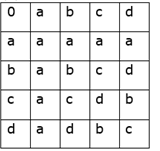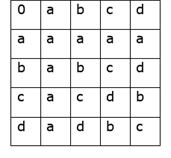Consider the binary operation * and 0 defined by the following tables on set S = {a, b, c, d}.

We observe the following:

a * b = b * a = a a * a = a
c * a = a * c = a b * b = b
a * d = d * a = a c * c = d
b * c = c * b = c d * d = c
b * d = d * b = d
c * d = d * c = b
There ‘ * ’ is commutative.
Also,
a * (b * c) = a * (c) = a (From above)
(a * b) * c = (a) * c = a (Also from above)
Hence, ‘ * ’ is associative too.
Therefore, to find the identity element, e for e belong to S, we need:
a * e = e * a = a, a belong to S.
Therefore, a * e = a
We find that there is no unique element e which satisfies the condition.
e = a or b or c or d for a.
Since the identity is not unique, the inverse will also be not unique.
9